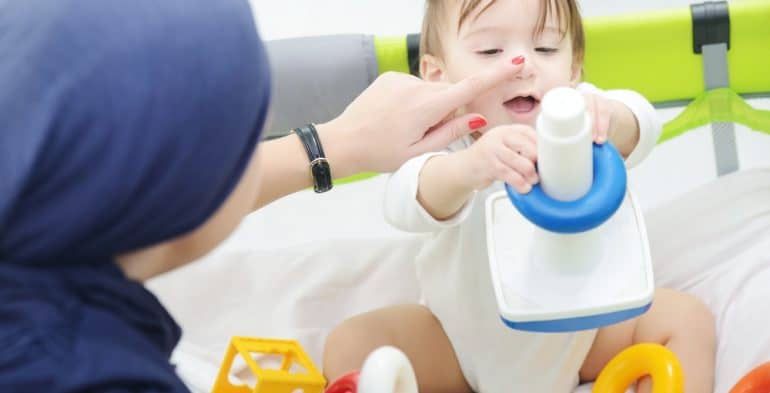
Social – Emotional Development
Social development is the process where your toddler learns to interact with other people, and understand and control their emotions. Babies start to develop relationships with the people around them right from birth, but the process of learning to communicate, share, and interact with others takes many years to develop. Developing the ability to control your emotions and behavior is also a long process. Children continue to develop their social-emotional skills well into their teenage years, or even young adulthood.
Just as in all other areas of child development, parents need to nurture teach and support their children. Providing a good role model is a key part of this. Your children learn how to be social by copying you!
Here are some Baby-Arabia advice and tips to help you:
Helping your child to become social
- Encourage your child to be helpful; let them help sort the washing or clear the table. Children who see themselves within a culture that cares about other people are more likely to have better social skills.
- Set a good example. Parents should be polite, respectful and caring to each other if they want their children to be respectful and caring too.
- Show affection to your children — even if you find this difficult. Children who are more open and affectionate are more likely to have friends.
- Value their social skills. When they are thoughtful or polite tell them how proud you are. Expect and value mutual respect and caring.
- Reduce the level of competition between children. Do not divide things equally — it only encourages the children to look for the bigger share. Give according to need.
- Love uniquely. A child who knows they are loved for who they are finds it easier to share something of themselves with others.
Helping toddlers to play together
Far from being a silly activity that just amuses your children, play (*a) is one of the most important elements of your child’s development. Key to developing social skills is the ability to play fairly and learning to share. This does not mean that children will never squabble. On the contrary, squabbling is an important part of the learning social skills and necessary for your child to learn to negotiate. However it is right to help your children learn to play nicely and you can help them to turn squabbling into healthy negotiation by teaching them to share.
One of the key areas that children squabble about is toys
Remember that a toddler’s possessions help define them. They see themselves as the little person with those parents, that house, that brother, bike, toy garage and teddy. This means that sharing is never a simple matter for children. Children worry very much that other children will take their toys away!
If a friend is coming to play:
- Discuss which toys they will leave out and which they will put away. Your child does not need to share them all.
- Don’t expect them to share their toys for hours at a time. They need to learn to trust, so build up the sharing time until they realize they will always get the toys back in the end.
- Try to find an activity for the children to share. A new batch of play dough or a new box of crayons, do not belong to either child. Nor do the cakes they might help you bake.
- Have a little chat with your child about sharing and then choose a secret word to remind her of what you talked about. ‘Remember’, for example, could mean, ‘Remember what we said’.
- Let them let off steam by running around to music, jumping off the sofa or throwing newspaper balls into a chair. Frustration needs release.
- Make sure you watch the children at first and if squabbles escalate intervene and remind both children who the toys belong to, where they are staying and how nice and kind it is that your child is sharing!
Baby-Arabia is committed to teaching your children to be responsible, sharing and caring young people.
A world of socially developed children is a world with a bright future!








